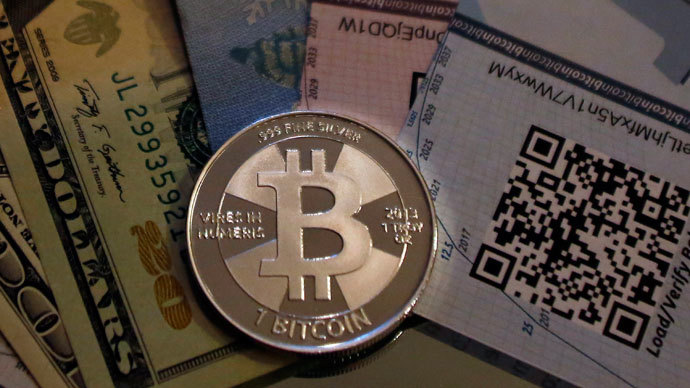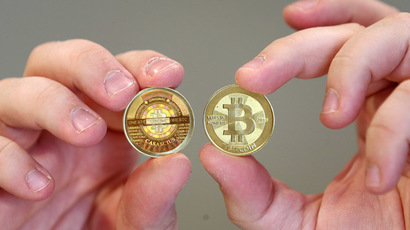Hunt for Silk Road users and Bitcoin fortunes intensifies

Officials in Britain, Sweden and the US have arrested eight more people in connection with Silk Road, the website for criminal services, as the search for millions of dollars in bitcoins – the currency of choice for online users – steps up a gear.
Britain’s newly unveiled National Crime Agency (NCA) flexed its muscles Tuesday when it detained four suspected drug offenders who used the “anonymous” services provided by Silk Road, dubbed the “Amazon.com of illegal drugs.”
The agency's director general, Keith Bristow, gave fair warning to other Internet drug dealers to be prepared for further crackdowns.
"These latest arrests are just the start,” he said. “There are many more to come."
The British investigation also promises to take a bite out of bitcoin, the virtual on-line currency used by Silk Road customers to buy and sell illicit goods and services. The NCA said it had seized millions of pounds worth of the electronic currency.
Meanwhile, the FBI reportedly seized the equivalent of $3.6 million in bitcoins in last week’s raid, but is still searching for over 600,000 bitcoins, worth about $80 million, that suspected Silk Road founder Ross Ulbricht is believed to have amassed while running the online drug operation, The Guardian reported.
Although initially it was thought that Ulbricht’s activities led to the physical location of Silk Road’s servers, rumors in hacker circles now point to the government itself hacked into the servers via Tor, and ran a program that allowed them to locate the real servers by using the everyday version of the Internet.
It now remains to be seen how the FBI will treat the seized bitcoins.
"At this early point in the history of bitcoin, I would be very surprised if the government has existing written policy on what to do if you seize digital currency," Jean-Jacques Cabou, a partner with the international law firm Perkins Coie, told Wired magazine.
Furthermore, no one even knows what “seized” means where Bitcoin is concerned, as all the FBI has said until now is that it “downloaded” the money from an online wallet on Silk Road.
Either way, the longer the FBI allows the “imaginary” money to just sit there, the more it will grow in value and the harder it will be to let go, Cabou said, adding: "With this much valuable property at stake… they certainly will want to get the money."
Ulbricht, 29, was arrested while using the Internet at a public library in San Francisco last week.
In a court appearance last Friday, Ulbricht’s lawyer said his client denied all charges brought against him.
Officials say Ulbricht ran Silk Road under the alias “Dread Pirate Roberts.”
The arrests emphasize the international scope of the crackdown, which began in earnest last week when the FBI conducted a raid on Silk Road, which has been described as the largest online drug dealing portal.
In Sweden, two men from the coastal city of Helsingborg were arrested on suspicion of distributing cannabis over Silk Road, local newspaper Helsingborgs Dagblad reported Tuesday.
US officials have brought charges against a couple from Bellevue, Washington, with one of them identified as the top 1 percent of sellers on the site.
“Steven L. Sadler allegedly sold cocaine, heroin and methamphetamine through Silk Road…and used the Postal Service as a major delivery system for his illegal enterprise,” according to the Bellevue Reporter.
In the last four months of sales documented, the criminal complaint alleges Sadler, who went by the user name “Nod,” sold more than 2,600 grams of cocaine, nearly 600 grams of heroin and 105 grams of methamphetamine.
Silk Road was used for more than just drug purchases, authorities say.
The FBI suspects thousands of people accessed Silk Road in its 2 1/2 years’ existence to buy and sell illicit drugs, acquire forged documents, and possibly even order assassinations. The total value of the trades exceeded $1.2 billion, the FBI says.
Meanwhile, British officials are describing the recent arrests as just the beginning of a broader crackdown on underground Internet crime.
"This is only the start of a wider campaign for the NCA to tackle the 'dark' or 'deep' web and the criminals exploiting it," Andy Archibald, head of the UK agency's National Cyber Crime Unit, said in a statement.
“These criminal areas of the Internet aren't just selling drugs; it's where fraud takes place, where the trafficking of people and goods is discussed, where child abuse images are exchanged and firearms are traded," he added.
Bristow warned Internet users who think their activity could be hidden with the help of technical applications.
"The hidden Internet isn't hidden and your anonymous activity isn't anonymous. We know where you are, what you are doing and we will catch you," he said in his statement.
Bristow revealed that hidden or anonymous online use were a main priority for the NCA, which employs some 4,000 officers to track criminal activity on the Internet.
According to an FBI affidavit filed in San Francisco, there were 957,079 user accounts on Silk Road.
Around 30 percent of the total users were located in the United States, with the next highest number of users based in the UK. The FBI did not disclose how many users there were in the UK.















